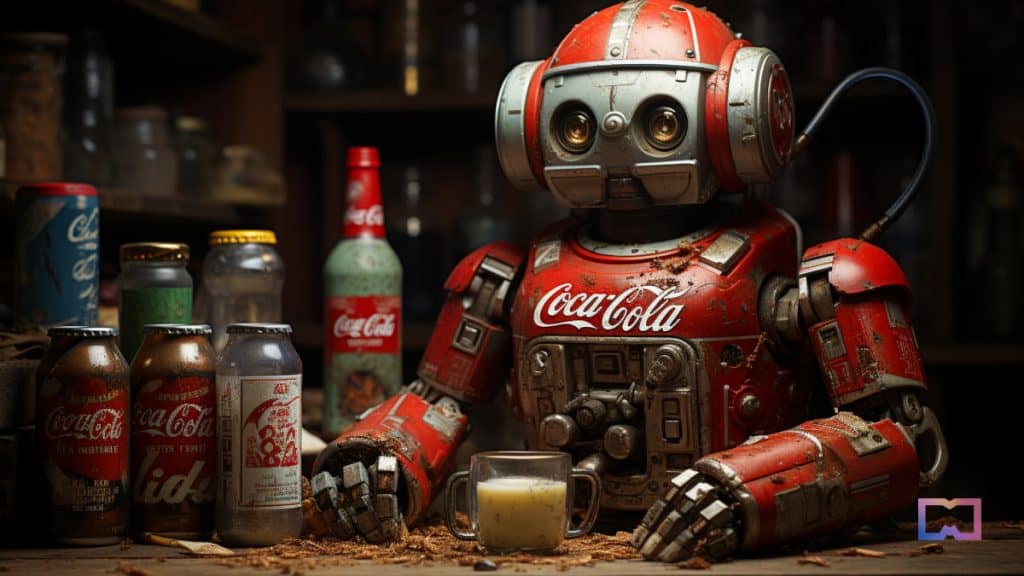
Global giants such as Nestle, Mars, Colgate-Palmolive, Coca-Cola and Unilever are embracing generative AI, utilizing tools like ChatGPT and DALL-E to enhance productivity and cut costs in advertising.
The surging interest in generative AI is reshaping operations and fostering novel avenues for enhanced efficiency and consumer engagement. The adoption of the technology is not only streamlining processes but also unlocking fresh opportunities across diverse industries.
Hikari Senju, founder and CEO of generative AI advertising platform Omneky, told Metaverse Post that AI acts as a co-pilot, not a human replacement for marketing campaigns. “Whether in advertising, legal or coding, AI can 10x human productivity. Generative AI tools could also inspire the human user to be more creative by generating novel suggestions and insights based on company assets and data.
Currently, this transformative technology is reshaping the advertising landscape, prompting companies to find equilibrium between harnessing AI’s potential and safeguarding against its pitfalls. While generative AI offers advertising opportunities, lingering concerns regarding security, copyright issues, and biased content emphasize the ongoing necessity of human involvement.
World’s Largest Companies Explore AI-Driven Marketing Initiatives
As reported by Reuters, advertising agency WPP has joined forces with consumer goods companies, such as Nestle and Mondelez, to incorporate generative AI into their advertisements. This strategic move holds the potential to yield cost savings ranging from 10 to 20 times.
WPP CEO Mark Read told Reuters: “Rather than flying a film crew down to Africa to shoot a commercial, we’ve created that virtually.”
WPP has engaged “20 AI apprentices in their early twenties,” as highlighted by Read, in collaboration with the University of Oxford for marketing courses. WPP’s website offers the “AI for business” diploma, which delivers data and AI training for client leaders, practitioners, and WPP executives.
Nestlé, along with consumer packaged goods companies such as Campbell’s, Mars, Givaudan, and PepsiCo, utilizes Tastewise, a generative AI platform, for validating new product concepts and generating market research reports.
Tastewise utilizes its proprietary AI technology and a comprehensive food consumption dataset to provide insights into popular restaurant dishes, home cooking trends, and genuine consumption patterns.
Unilever, a conglomerate with more than 400 brands, including Dove soap and Ben & Jerry’s ice cream, has created its generative AI technology to craft product descriptions on retail and digital commerce sites. The TRESemmé haircare brand under Unilever uses AI for both written and visual content on Amazon.co.uk.
Aaron Rajan, Unilever’s global vice president of Go To Market Technology, emphasized the company’s dedication to preventing the replication of biases, such as gender or racial stereotypes, present in the processed data. He underlined the importance of ensuring unbiased outcomes from the technology.
Colgate-Palmolive said that it makes use of generative AI for crafting marketing content and e-learning materials. Meanwhile, Coca-Cola, an early adopter of OpenAI’s generative AI, leads in integrating AI within marketing campaigns and consumer experiences. The company’s pilot program incorporates AI to generate original artwork.
Likewise, Mars utilizes generative AI in diverse fields, including pet care research and manufacturing process improvements. The company said that it is focusing on importance of responsible usage and has established a policy framework and governance. It collaborates with entities like Microsoft and the Responsible AI Institute to address the ethical aspects of AI applications.
AI Risks in Advertising
According to Omnkey’s CEO, understanding which base models are being used or built on is critical for mitigating AI concerns like security, copyright, and bias.
“For example, GPT based models are more secure and have less risk regarding copyright and bias, but may have concerns related to sending data to OpenAI. Companies may choose alternatives like Stable Diffusion deployed on company controlled servers, but this may have greater risks associated with copyright and bias,”
Senju said.
Companies can fine-tune open-sourced models like Llama-2 on machines they control, which will be more secure, but there will be greater concerns regarding the quality of model output.
“Techniques like fine tuning, prompt engineering and RLHF (Reinforcement Learning with Human Feedback) can be used to engineer models to better handle security, copyright and bias but certain techniques may be hard to implement or come at the cost of output quality,” he added.
Regarding ethical considerations, brand safety is paramount when it comes to AI in advertising.
“A rogue AI generating content that is not on brand is a risk and so it is paramount to design these systems with guardrails and ultimately have the human user in control of the output,” Senju said.
Read more:
Read More: mpost.io









 Bitcoin
Bitcoin  Ethereum
Ethereum  Tether
Tether  XRP
XRP  Solana
Solana  USDC
USDC  Dogecoin
Dogecoin  Cardano
Cardano  TRON
TRON  Lido Staked Ether
Lido Staked Ether  Wrapped Bitcoin
Wrapped Bitcoin  Sui
Sui  Chainlink
Chainlink  Avalanche
Avalanche  Stellar
Stellar  Bitcoin Cash
Bitcoin Cash  Wrapped stETH
Wrapped stETH  LEO Token
LEO Token  USDS
USDS  Shiba Inu
Shiba Inu  Hedera
Hedera  Toncoin
Toncoin  Hyperliquid
Hyperliquid  Litecoin
Litecoin  Polkadot
Polkadot  WETH
WETH  Monero
Monero  Binance Bridged USDT (BNB Smart Chain)
Binance Bridged USDT (BNB Smart Chain)  Bitget Token
Bitget Token  Wrapped eETH
Wrapped eETH  Ethena USDe
Ethena USDe  Coinbase Wrapped BTC
Coinbase Wrapped BTC  Pi Network
Pi Network  WhiteBIT Coin
WhiteBIT Coin  Pepe
Pepe  Bittensor
Bittensor  Dai
Dai  sUSDS
sUSDS  Aptos
Aptos  Uniswap
Uniswap  OKB
OKB  NEAR Protocol
NEAR Protocol  Ondo
Ondo  BlackRock USD Institutional Digital Liquidity Fund
BlackRock USD Institutional Digital Liquidity Fund  Aave
Aave  Cronos
Cronos  Gate
Gate  Ethereum Classic
Ethereum Classic  Internet Computer
Internet Computer